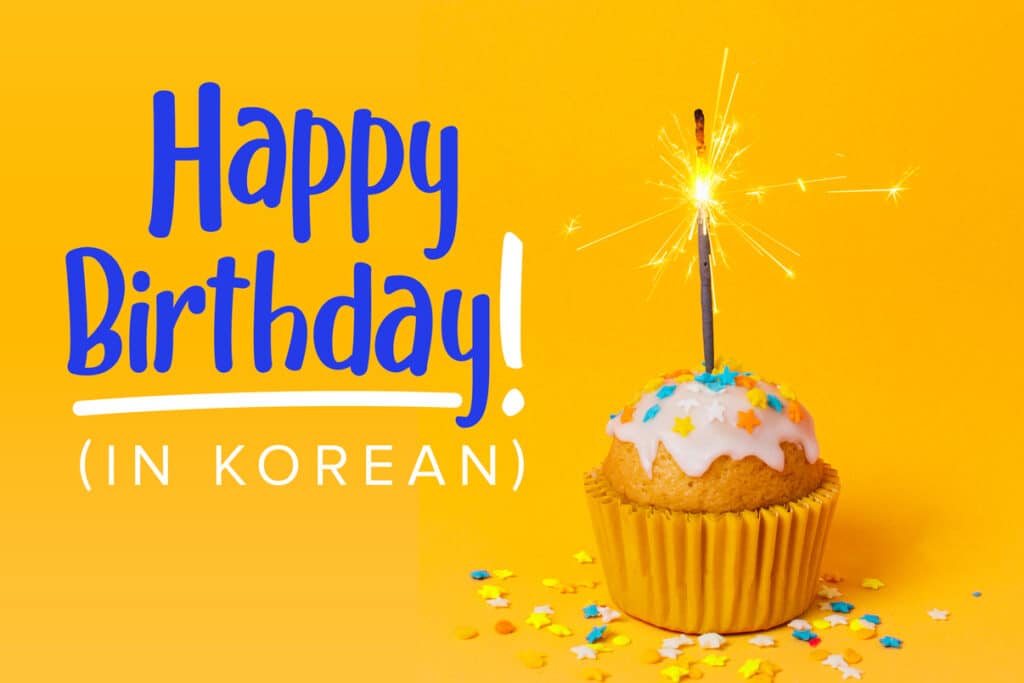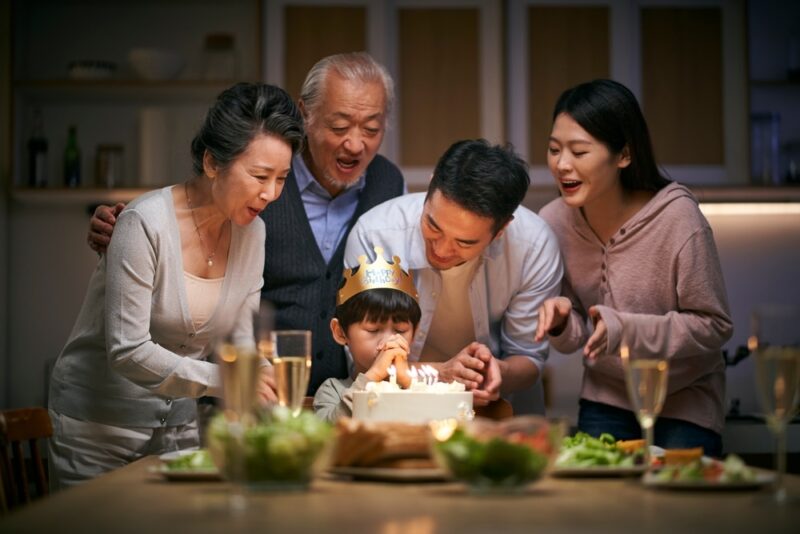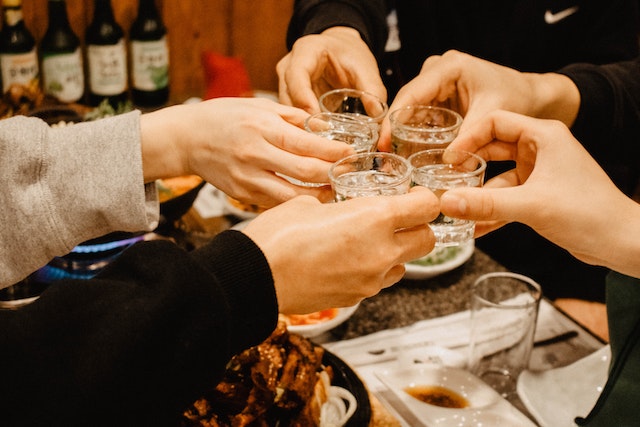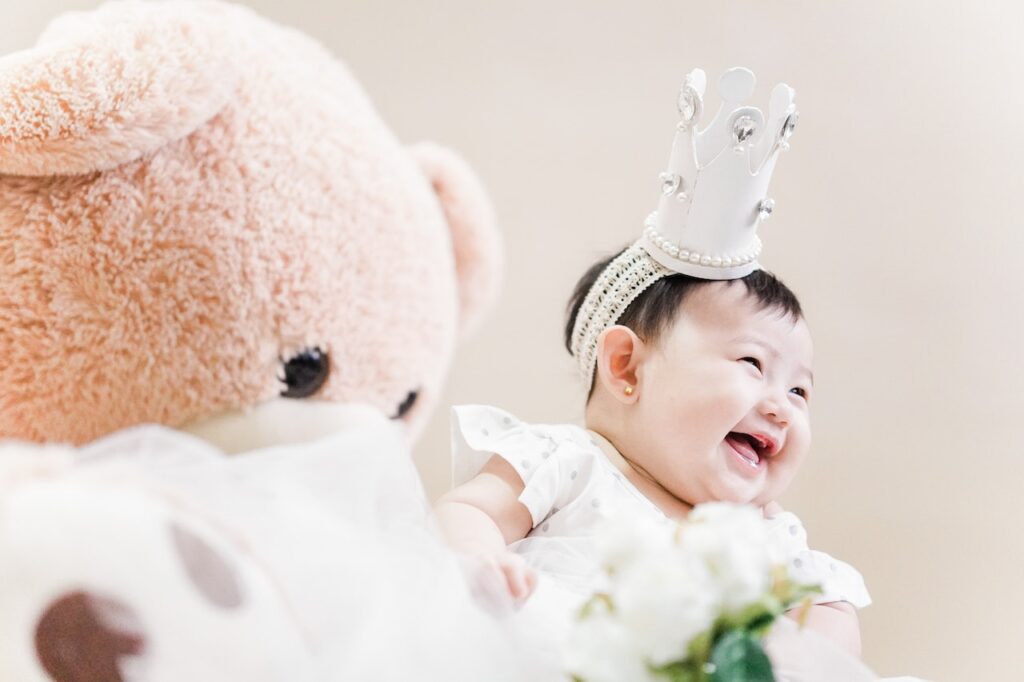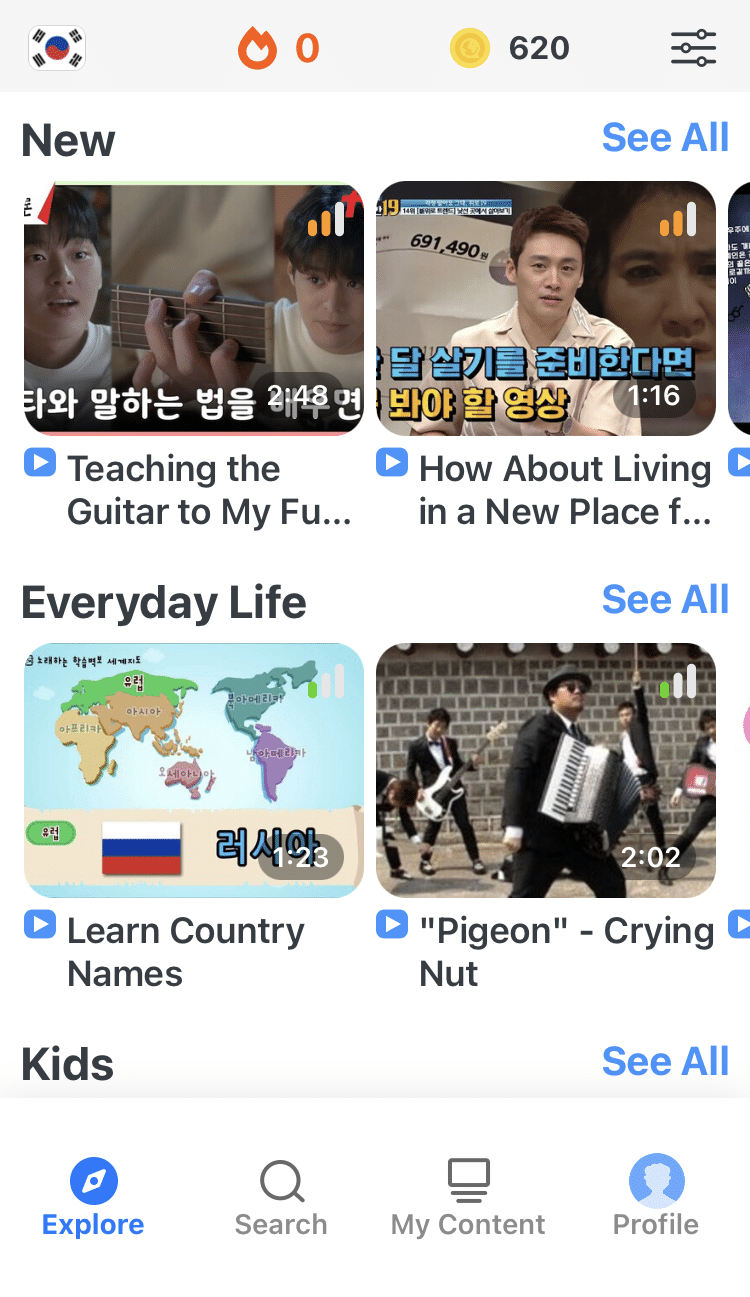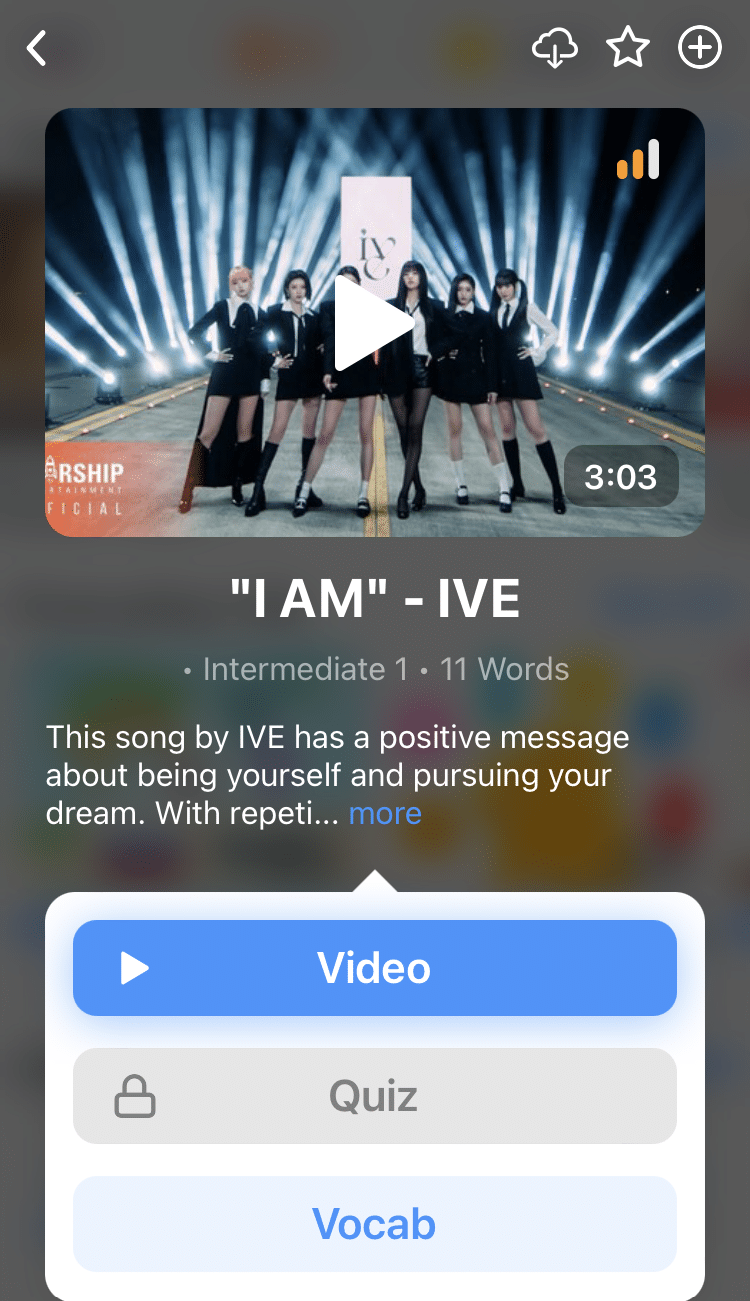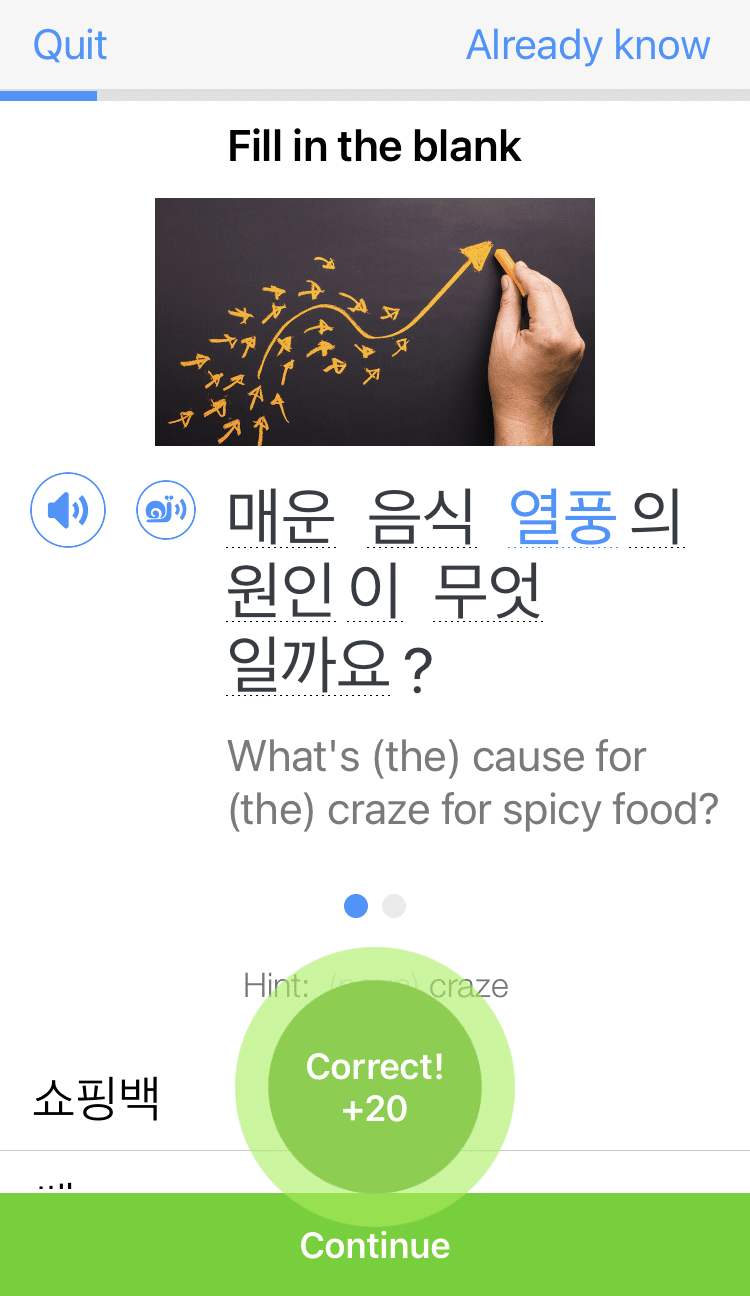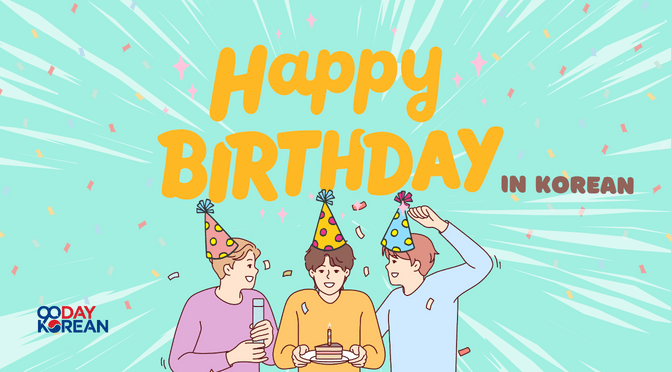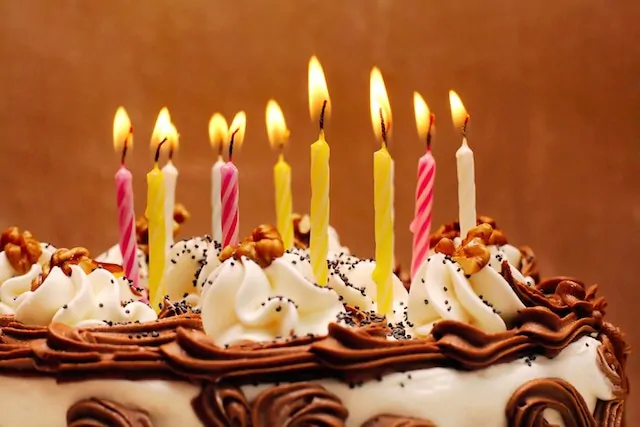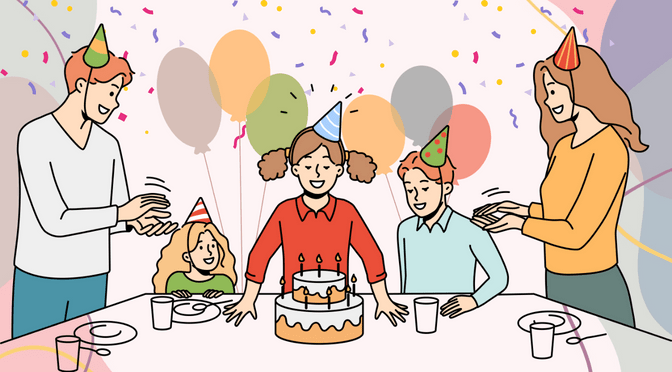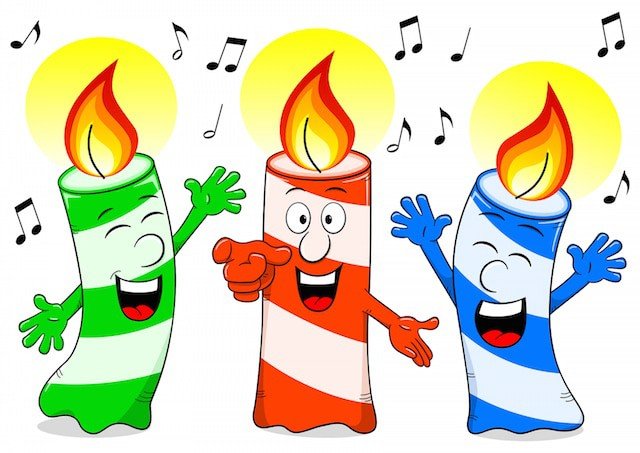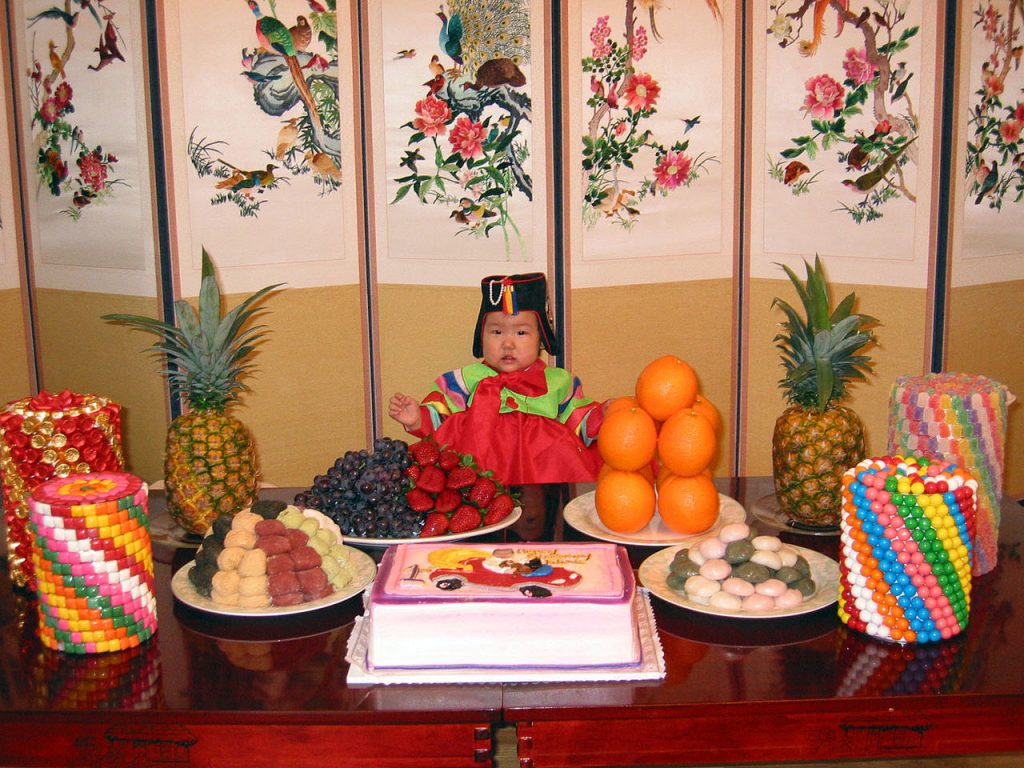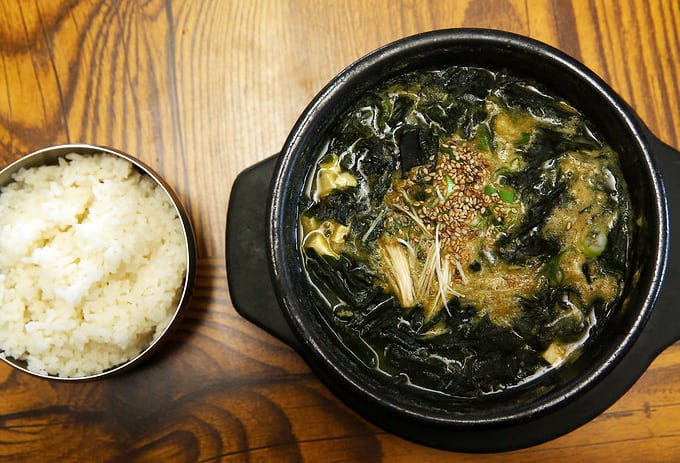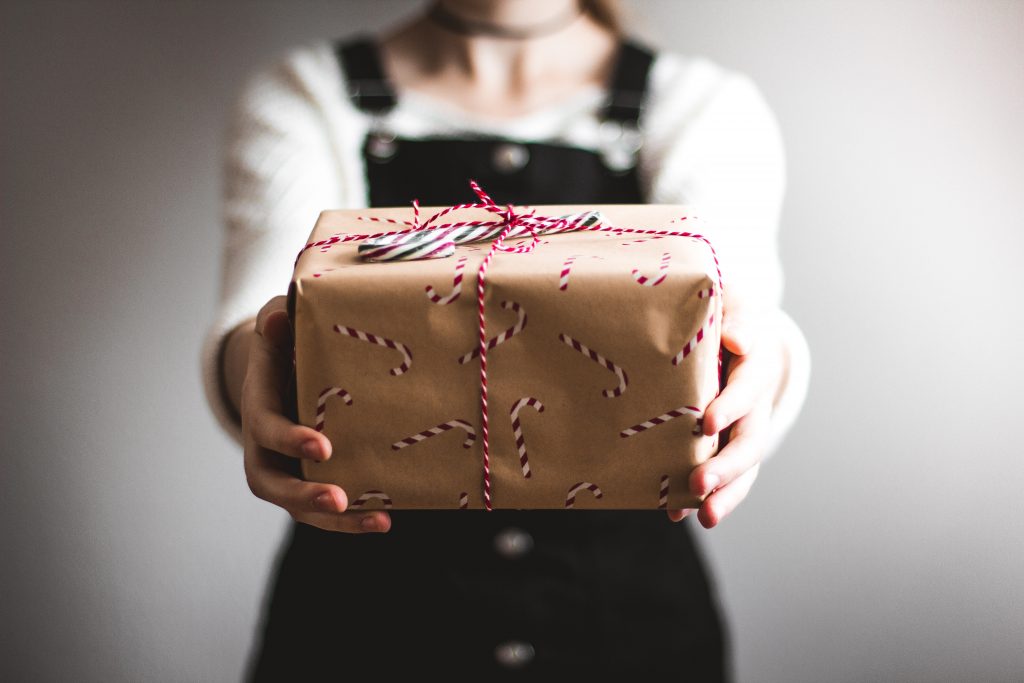By Last updated:
The clock strikes midnight, and already you feel a little bit different.
That’s right! It’s your birthday, and you know what to expect based on your own culture and upbringing.
But now that you’re studying Korean, you’re probably curious about how Korean folks might have their own birthday bash.
In this post, I’ll go over how you can wish someone a happy birthday in Korean, plus some special birthday customs you should expect.
Contents
- How To Say Happy Birthday in Korean
-
- 1. 생신을 축하드립니다
- 2. 생신 축하드려요
- 3. 생일 축하합니다
- 4. 생일 축하해요
- 5. 생일 축하해
- 6. 생축
- 1. 생신을 축하드립니다
- How To Celebrate Birthdays in Korea
-
- Korean Birthday Customs
- The Korean Aging System
- A Korean Baby’s First Birthday
- A Korean Person’s 60th Birthday
- The Korean Happy Birthday Song
- And One More Thing…
Download: This blog post is available as a convenient and portable PDF that you
can take anywhere. Click here to get a copy. (Download)
How To Say Happy Birthday in Korean
How you say happy birthday will largely depend on who you’re saying it to. Understanding the relationship you have with your conversation partner is a big deal when it comes to talking in Korean.
Here are some different ways of saying it in descending levels of formality. Check out this post on honorifics and titles, and if in doubt, always use a more formal version of the phrase!
1. 생신을 축하드립니다
Romanization: Seng-shin-eul chook-ha-deu-rim-ni-da
Formality: Formal
This is a formal way of wishing someone a happy birthday. 생신 is the more respectful way of saying birthday in Korean (we’re show you the more common word below).
The ending of 드립니다 may have already clued you to the formality, if you’re familiar with verb conjugation based on formality level. It’s appropriate to use for your elders or those in a higher position, such as your boss or teacher.
As you’ll see in several examples below, in Korean you usually use titles to address others rather than names.
생신을 축하드립니다, 대표님! 오늘 저희 회사에서 이 과일 바구니를 생신 선물로 가져왔습니다.
Happy birthday, Ms. CEO! Our company brought this fruit basket for you today as a birthday gift.
2. 생신 축하드려요
Romanization: Seng-shin chook-ha-deu-ryuh-yo
Formality: Formal
You could alternatively say this one instead of the first one. All this phrase is doing is taking the formality level one notch down by replacing 드립니다 with 드려요 part, although it might be slightly harder to pronounce!
Since 생신 is still used here, it’s nonetheless extremely polite. You can still use this one with elders, bosses and teachers, although perhaps you know them slightly better than the people in the previous phrase.
생신 축하드려요, 교수님! 파티를 하실 거예요?
Happy birthday, Professor! Are you going to have a party?
3. 생일 축하합니다
Romanization: Seng-il chook-ha-ham-ni-da
Formality: Formal
This is likely the most common happy birthday phrase you’ll hear. Note the difference in the wording compared to the more formal variant. 생일 literally translates to “birthday” (생 meaning birth, 일 meaning day).
It’s polite in tone and appropriate for most occasions, whether you’re using it for acquaintances or those older than or close to your age.
생일 축하합니다, 선생님! 오늘 우리에게 많은 숙제를 주지 마세요.
Happy birthday, teacher! Please don’t give us a lot of homework today.
4. 생일 축하해요
Romanization: Seng-il chook-ha-hae-yo
Formality: Polite
This is the next most common one. It too is polite in tone (evidenced by the presence of 요), although I’d say it’s a bit less formal than 생일 축하합니다.
This might be a good one suited for peers or people who are younger than you, but you work with them or are not necessarily friends or extremely close.
생일 축하해요, 이태민씨! 오늘 좋은 하루 되세요!
Happy birthday, Mr. Lee! Have a nice day today!
5. 생일 축하해
Romanization: Seng-il chook-ha-heh
Formality: Informal
Notice the lack of honorific language in the phrase–it implies that you don’t have to be so uptight or respectful to the birthday boy or girl.
This is informal in nature and is appropriate for your friends and casual acquaintances around your age or younger. You could use it with people you are pretty close with, such as your family as well. Although some families stick to being more polite!
생일 축하해, 지연아! 생일 파티는 몇 시야?
Happy birthday, Ji-yeon! What time is the birthday party?
6. 생축
Romanization: Seng-chook
Formality: Very informal
This is a slang variant that is just a greatly abbreviated version of the typical happy birthday phrase. You may see it in text or online. Another abbreviation you might encounter is 생일 ㅊㅋㅊㅋ, read as seng-il choo-ka choo-ka.
It’s common in Korean social media to simply shorten familiar phrases into singular Hangul letters. Since this is slang we’re talking about, you should reserve these specific happy birthday phrases for close friends or online pals.
순영아, 생축!! 우리 나중에 만나는 거지? 생일 ㅊㅋㅊㅋ!
Soon-yeong, happy birthday!! We’re going to meet later, right? HBD!
One way to practice all these sentences is through a language learning program such as FluentU, which shows you how the language is really used by native speakers in different situations.
How To Celebrate Birthdays in Korea
Korean Birthday Customs
In modern times, Korean birthday celebrations don’t look much different from Western ones. A cake, some presents and a fun get-together are the usual expectations.
Kids may have a party with their family members and friends, while older folks may celebrate at home, a bar or a restaurant. For the latter, it’s likely that plenty of alcoholic drinks like 소주 (so-ju) will go around the table.
To really follow tradition, birthday persons may also eat the seaweed soup known as 미역국 (mi-yuk-gook). This nutritious dish has a history of being a food consumed by expecting pregnant women. It has a strong connotation to birth and health, making it a fitting choice as a birthday meal.
The Korean Aging System
Let’s say you meet a Korean person who was born on May 12, 1990. So, on May 13, 2023, you may say to them “Hey! Congratulations on turning 33 years old!” They might correct you and say they’re actually 34 years old. Ask them again on January 2, 2024, and they’ll proclaim they’re 35 years old.
According to Korean culture, you’re technically considered one year old the moment you’re born. This is sensible, since you were “alive” for nine months in the womb, which is close enough to a year. Furthermore, you actually age up a year right at New Year’s, on January 1.
This means that in Korea, a person’s age can be one or two years older than they would be considered internationally. If you’re wondering how this works, then you can quickly calculate your own Korean age.
The birth age is still used for most official documentation and formal paperwork, so this system is used more in general everyday life. Plus, it’s currently being phased out, with the switch to the international aging system coming up in June 2023.
A Korean Baby’s First Birthday
A very special birthday celebration takes place when you turn an impressive one year old. It even has its own name: 돌잔치 (dol-jan-chi). Alongside a big party with family members and guests, one-year-old babies have an important job to play in their own festivities.
The toddlers will be dressed in a special traditional 한복 (han-bok). They may be seated before an impressive spread of Korean food that includes plenty of colorful rice cakes known as 떡 (tteok) and fruits.
The child will then be presented with an arrangement of what appear to be miscellaneous items. The item options are usually decided by the parents, but they typically include something like a bowl of rice, a pencil, a book, thread, money bills and more. Modern variants can include items like a smartphone, a computer mouse, a sports ball and so forth.
At some point, the baby may grab at or show interest in one or two items. Whatever is chosen is said to symbolize a specific fortune. For example:
- Choosing a pencil: the child will gain strong writing and or academic skills
- Choosing a paintbrush: the child will be artistically gifted
- Choosing money: the child will become rich
- Choosing thread or yarn: the child will live a long life
- Choosing a food item: the child will not go hungry
Modern items follow a similar system of fortune-telling. For example, a child picking up a computer mouse can suggest they’ll be nifty with technology.
This fun and exciting event, called 돌잡이 (dol-jap-ii), gives loved ones a chance to imagine a bright future for the baby of the hour.
A Korean Person’s 60th Birthday
Reaching the age of 60 is also considered a special occasion in Korea.
If you’re familiar with the Chinese zodiac, then you might know why. 60 years is the marker when you’ve reached a full cycle of your zodiac lifespan, so that the calendar again points to the same zodiac signs under which you were born.
Most Korean folks are well-attuned to their zodiac. In the past, just like how it was good fortune for a baby to reach their first birthday, it was also considered momentous for one to reach the ripe old age of 60. Celebrating this occasion is known as 환갑 (hwan-gap).
It’s typical for the birthday person’s family to throw them a memorable party. Alternatively, the individual can opt to go on a nice trip with their loved ones.
There are also some who choose not to celebrate their 60th. Instead, they may save more lavish festivities for a more “impressive” birthday like their 70th, 80th or even their 90th.
The Korean Happy Birthday Song
You’ll be pleased to know that it’s actually very simple to sing the happy birthday song in Korean. You only have to know two phrases.
The first is 생일 축하합니다, which we’ve already discussed to be the formal way of saying “Happy birthday.” Even though this is the phrase of choice, the song is appropriate for pretty much everyone: young, old, friends, acquaintances or strangers.
The second phrase is 사랑하는 (우리) ________ (씨), which means “Beloved (insert name)”, with the option to include 우리 before the name or 씨 after the name:
- 우리 means “our” and is typically used for close friends and family members, especially if they’re younger.
- 씨 is a basic Korean honorific that you may want to include if the birthday person deserves a little more respect (such as your workplace colleague).
With those two phrases, the format of the actual song goes like this:
생일 축하합니다
Happy birthday to you
생일 축하합니다
Happy birthday to you
사랑하는 (우리) ________ (씨)
Beloved _______
생일 축하합니다
Happy birthday to you
Sing it to the same tune as “Happy Birthday to You” (yes, the English one you know by heart) and that’s it. It’s that easy!
Sometimes, the song can include a few extra lines (such as in the video above), though they can vary a lot depending on the context. However, you’ll more often hear just the simple two-phrase song.
Korean birthday customs have both familiar and unique features. They’re another fun and worthwhile aspect of Korean culture to learn, alongside your Korean language studies.
So bust out the cake (or 미역국 ) and start the celebrations!
Download: This blog post is available as a convenient and portable PDF that you
can take anywhere. Click here to get a copy. (Download)
And One More Thing…
If you enjoyed this post, you’re already halfway to having the time of your life learning Korean with FluentU!
FluentU makes it possible to learn with K-pop videos, funny commercials, entertaining web series and more. Just a quick look will give you an idea of the variety of FluentU videos on offer:
FluentU really takes the grunt work out of learning languages, leaving you with nothing but engaging, effective and efficient learning. It’s already hand-picked the best videos for you (which are organized by level and topic), so all you have to do is simply choose any video that strikes your fancy to get started.
Each word in the interactive captions comes with a definition, audio, image, example sentences and more.
Access a complete interactive transcript of every video under the Dialogue tab, and easily review words and phrases from the video under Vocab.
You can use FluentU’s unique Quiz Mode to learn the vocabulary and phrases from the video through fun questions.
FluentU keeps track of what you’re learning, and tells you exactly when it’s time for review, giving you a 100% personalized experience.
Review sessions use video context to help embed the words in your memory.
Start using the FluentU website on your computer or tablet or, better yet, download the FluentU app from the iTunes or Google Play store. Click here to take advantage of our current sale! (Expires at the end of this month.)
Поздравления с днем рождения на корейском — пожелания
Как поздравить на корейском языке красиво и правильно? Список поздравлений с днем рождения и пожеланий на корейском языке с переводом на русский.

—
Пожелания на корейском языке, фразы:
1. 태어나줘서 고마워요~ — Спасибо, что ты родился.
2. 너는 최고! — Ты лучший/лучшая.
3. 항상 건강하고 언제나 밝은 웃음 간직하길 바래요~ 진심으로 축하해요! — Желаю чтобы вы всегда были здоровы и на вашем лице сияла такая яркая улыбка. Искренне поздравляю!
4. 멋진 생일 보내세요! — Желаю крутого дня рождения!
5. 항상 건강하시고 행복하세요! — Всегда будьте здоровы и счастливы!
5.1 항상 건강하고 행복해요! — Всегда будь здоров и счастлив!
6. 행복한 생일날 되세요! — Желаю счастливого дня рождения! (более официально)
7. 오늘같은 특별한 날 행복한 일들이 많이 생기길 바랍니다. — Я желаю вам, чтобы такой особенный день как сегодня был наполнен счастливыми мгновениями.
8. 네 모든 소원이 이루어지길 바래요~ — Надеюсь все твои желания сбудутся~
9. 성공하고, 항상 행운이 함께 하길 바랍니다. — Желаю вам успеха, чтобы удача всегда была на вашей стороне!
9.1 성공하고, 항상 행운이 함께 하길 바래용! — Желаю тебе успеха, чтобы удача всегда была с тобой!
*10. 모든 꿈이 이루어지길 바랍니다! — Желаю, чтобы все ваши мечты сбылись!*

11. 나는 네가 행복하고 여행이 많이 있기를 바랍니다! (특히 러시아에 여행 ㅎㅎ^^) — Желаю, чтобы ты был счастлив и у тебя было много путешествий! (особенно в Россию ха-ха^^).
12. 당신은 훌륭한 사람입니다 :3 — Вы великий человек :3
13. 언제나 행복하고, 건강하고, 오래오래 웃음지을 날이 많기를 바래요! — Всегда будь счастлив, здоров, желаю чтобы дней, когда ты улыбаешься было много-много!
14. 앞으로도 항상 멋지고 행복하기를 바랍니다! — Желаю чтобы вы и дальше были таким же крутым и счастливым 🙂
15. ‘생일’인 오늘만 행복하지 말고 1년 365일, 하루하루가 생일처럼 행복하길 바래요!^^ — Не только в день рождения, а 365 дней в году будь также счастлив как сегодня!^^
16. 너는 네가 원하는 모든 걸 얻을 수 있다! — Ты можешь получить всё, что ты хочешь!
17. 생일 진심으로 축하하고 앞으로 더 많이 사랑해줄게! — Искренне поздравляю тебя и впредь буду любить еще больше!
18. 뜻깊은 오늘! 그 어느 때보다도 아름다운 날이 되기를 바랍니다! — Сегодня значительный день~ Желаю чтобы он стал самым прекрасным днем чем когда-либо!
Поздравления с днем рождения на корейском языке:
1. 생일 축하해 — С днем рождения! (другу)
2. 축하축하 (쭈카쭈카) — Поздравляшки поздравляшки! (милый сленг, а то, что в скобках — еще более мило).
3. 생일 축하해요! — С днем рождения! (знакомому, другу, старшему)
4. 생일 축하합니다 — С днем рождения! (официально)
5. 해삐벌쓰데이 🙂 — Хэппи бёздэи!
—
_________________________________________
Поздравления с днем рождения на корейском — пожелания
P.S. Перевод пожеланий можете спрашивать в комментариях~
Читать другие статьи сайта:
—
— Места съёмок дорам в Кореи — куда сходить
— Дорамы про школу 2020
In this article, we’ll learn how to say “Happy Birthday” in Korean.
There are a few different ways to say “Happy Birthday” in Korean, and you can also use the happy birthday verb for other situations. It’s quite useful!
Looking to get some singing practice? Well, you’re in luck, then. Not only will we explain that phrase, but we’ll also teach you the famous Happy Birthday song–in Korean!
Want to join the fun at your next Korean birthday party? To help you put what you’ve learned in this lesson to use, we made a PDF sing-along sheet for the Happy Birthday song in Korean. You can print this out or use it on your smartphone to sing the Korean version of the Happy Birthday song. Check it out below:
Contents
- 1 “Happy Birthday” in Korean
- 2 “Birthday” in Korean
- 3 How to Say “Happy Birthday” in Korean
- 3.1 “Happy Birthday” in Korean (formal)
- 3.2 “Happy Birthday” in Korean (standard)
- 3.3 “Happy Birthday” in Korean (informal)
- 4 How to Write “Happy Birthday” in Korean
- 5 Birthdays in Korea
- 5.1 Korean Birthday Food
- 5.2 Korean Birthday Party
- 6 Korean Birthday Song
- 6.1 Happy Birthday Song in Korean
- 7 Wrap Up
Maybe you have some Korean friends or a Korean significant other. Or you might be taking a trip to Korea soon, and want to make a good impression during your visit by studying this vocabulary. Then you’ll definitely want to know the words for “happy birthday” in Korean.
Before we dive in, check out this video on how to say “Happy Birthday” in Korean:
How to Say HAPPY BIRTHDAY in Korean | 90 Day Korean
“Birthday” in Korean
The word “birthday” in Korean is 생일 (saengil). You can use this word when referring to your own birthday. You can also use it when referring to the birthday of somebody who is of a similar or younger age than yourself.
However, if you want to refer to the birthday of somebody who is a lot older than you, then you should use the word 생신 (saengsin) instead. You would likely use this version of “birthday” with people such as your grandparents or older relatives.
“Birthday” is one of those special Korean words that have an honorific version of the word, which is used when talking to people about a generation (or more) older than you. Honorifics in the Korean language are used to show respect to elders.
Some other nouns with this honorific form include “age” and “house.” Some verbs with an honorific form include “to exist,” “to eat,” and “to sleep.” These are keywords to know if you want to learn to speak Korean.
We’ll give you the different formal levels to pronounce it below in the 한글 (Hangeul), the Korean alphabet, with Romanization. But if you can’t read the Korean alphabet yet, it’d be a massive boost to your Korean learning if you did. It’s easy to learn, so why not give it a try?
Now, let’s go to the fun part! Let’s learn how to say “Happy birthday” in Korean.
How to Say “Happy Birthday” in Korean
Here are three ways to say “Happy Birthday” in Korean:
- 생신을 축하드립니다 (saengsineul chukadeurimnida)
- 생일 축하합니다 (saengil chukahamnida)
- 생일 축하해 (saengil chukahae)
Each of these phrases has a different level of formality and should be used appropriately depending on who you are speaking to.
We’ll explain each one and give you an audio guide on how to pronounce them.
“Happy Birthday” in Korean (formal)
The formal way to say “Happy Birthday” in Korean is 생신을 축하드립니다 (saengsineul chukadeurimnida). You can use this phrase when saying “happy birthday” to people who are much older than you. It uses the formal word for birthday.
Listen here:
The verb here is 축하하다 (chukahada), which means “to celebrate” or “to congratulate.” It’s combined with the verb 드리다 (deurida), which is the formal version of “to give.” You would use this version of happy birthday in Korean to show a lot of respect for the person you’re saying it to. You might use this with your grandparents or your professor at your university.
You can use a less formal version (such as the standard or informal version) of “Happy birthday” if it’s someone that is close to you and/or younger than you.
Can’t read Korean yet? Click here to learn for free in about 60 minutes!
“Happy Birthday” in Korean (standard)
There are two ways to “Happy Birthday” in Korean that follow the standard form: 생일 축하합니다! (saengil chukahamnida) and 생일 축하해요! (saengil chukahaeyo). These versions are considered polite.
Listen Here:
Listen Here:
생일 축하합니다! (saengil chukahamnida) and 생일 축하해요! (saengil chukhahaeyo) are set phrases and can be used on most occasions. They are also the versions of “happy birthday” that appear on birthday cards.
The two versions are similar, except that the 합니다 (hamnida) version is slightly more formal.
The word 축하합니다 (chukahamnida) in 생일 축하합니다 (saengil chukahamnida) means “to congratulate”. You can say this word on its own if you want to congratulate somebody on achieving something.
If you only want to learn one way how to say “happy birthday” in Korean, then learn these phrases.
Saengil Chukhahaeyo Meaning
Saengil Chukhahaeyo means “Happy birthday.” It is the common Romanization of the Korean birthday greeting “생일 축하해요.” It’s a slightly less formal version 생일 축하합니다! (saengil chukahamnida) but is still considered polite.
“Happy Birthday” in Korean (informal)
“Happy Birthday” in Korean is 생일 축하해! (saengil chukahae). It’s considered the informal/casual version and can be used with friends of the same age.
Listen here:
It’s very similar to 생일 축하해요 (saengil chukahaeyo), except the final 요 (yo) is dropped at the end. This makes it much more informal. Use it wisely!
Some examples of people you might use this version of the phrase with would be close friends, young children, spouses, or siblings. Even though it’s informal, there is some benefit in using this “happy birthday” phrase appropriately. It shows a degree of closeness that you wouldn’t get with the other, more formal versions.
How to Write “Happy Birthday” in Korean
Here’s how to write Korean birthday greetings:
“Happy Birthday” in Korean (formal) → 생신을 축하드립니다
“Happy Birthday” in Korean (standard) → 생일 축하합니다 or 생일 축하해요
“Happy Birthday” in Korean (informal) → 생일 축하해
You can read our guide on Hangul Stroke Order to improve your Korean writing skills. Practice writing these phrases today, and let us know how you did in the comments section!
Birthdays in Korea
Here we’ll talk about the different beliefs, practices, and traditions when people celebrate birthdays in Korea.
Korean Birthday Food
Usually, on people’s birthdays, their friends or co-workers will buy them a birthday cake. The cake is then eaten as a group, like your co-workers or loved ones.
When buying a cake in Korea, you will often be asked how many candles 양초 (yangcho) you need. These candles, along with some matches, will be placed inside the cake’s box.
People often eat seaweed soup 미역국 (miyeokguk) on their birthday as this is a food that mothers often eat during pregnancy in Korea.
Korean Birthday Party
In the past, infant mortality was very high in Korea, so traditionally, a child’s first birthday is very important. Parents will throw a huge party, called a 돌잔치 (doljanchi), on this day. They will invite lots of people. If you live in Korea, you might end up being invited to such a party.
Korean Birthday Song
The Korean birthday song is a familiar song to many as it uses the tune of the English happy birthday song. The only difference would be the language used in the song.
In the section below, you’ll learn the Korean birthday song lyrics.
Happy Birthday Song in Korean
Here we’ll learn Happy Birthday in Korean Lyrics. This song follows the same tune as “happy birthday” in English and is very easy to learn.
♩ ♪ ♫
생일 축하합니다
생일 축하합니다
사랑하는 (insert name) 씨
생일 축하합니다
♪ ♫
saengil chukahamnida
saengil chukahamnida
saranghaneun (insert name) ssi
saengil chukahamnida
Wrap Up
Now that you know how to say AND sing “happy birthday” in Korean, why not write a birthday greeting too? Creating one will be easier if you learn about Korean sentence structure. Now, it’s time to go out and celebrate!
Was this post helpful?
YesNo
Поздравления с Днем Рождения на корейском языке
***
사랑하는 친구야! 생일 축하해! 항상 건강하고 행복하기를 바랄게요.
***
당신이 생일을 맞이한 이유는 당신이 태어난 날, 이 세상이 당신을 기다렸기 때문입니다. 생일 축하해요!
***
행복하고 즐거운 생일을 보내길 바래요. 당신이 원하는 것들을 모두 이루시길 기원합니다.
***
당신의 생일은 이 세상에서 가장 특별한 날 중 하나입니다. 항상 행복하게 살길 바랄게요.
***
오늘은 당신의 생일이니까, 자유롭게 웃으며 즐겨주세요. 생일 축하해요!
***
당신이 생일을 맞이한 이유는 당신이 이 세상에서 가장 아름다운 존재이기 때문입니다. 생일 축하해요!
***
당신의 생일을 축하합니다. 늘 건강하시고 행복한 일들만 가득하시길 기원합니다.
***
오늘은 당신의 생일, 이 순간을 잊지 않을 거에요. 항상 행복하길 바랄게요.
***
생일 축하합니다. 새로운 한 해가 더욱 좋은 일들로 가득하기를 바랄게요.
***
오늘은 당신의 생일이니까, 모든 것을 내려놓고 즐겨주세요. 항상 행복하기를 바라요.
***
생일 축하합니다. 이번 생일을 맞이하면서, 당신의 새로운 시작을 응원합니다.
***
오늘은 당신의 생일, 많은 사람들이 당신을 기다리고 있어요. 항상 행복하길 바랄게요.
***
생일 축하합니다. 당신의 삶이 항상 행복하고 아름다운 일들로 가득하기를 기원합니다.
***
오늘은 당신의 생일, 이 순간을 놓치지 마세요. 항상 행복하기를 바라요.
***
생일 축하합니다. 오늘은 당신이 빛나는 주인공입니다. 항상 건강하고 행복하기를 바랄게요.
***
당신의 생일을 축하합니다. 늘 건강하고 행복하기를 기원합니다.
***
오늘은 당신의 생일, 이 순간을 잊지 마세요. 항상 행복하길 바라요.
***
오늘은 당신의 생일, 이 순간을 영원히 기억할 거에요. 항상 행복하길 바라요.
***
생일 축하합니다. 이번 생일을 맞이하면서, 더욱 자신에게 도전하고 성장하기를 바랄게요.
***
오늘은 당신의 생일, 모든 사람들이 당신의 생일을 축하하고 기다리고 있어요. 항상 행복하길 바라요.
***
생일 축하합니다. 오늘은 당신의 하루, 많은 사람들이 당신을 생각하고 있어요. 항상 건강하고 행복하기를 바랄게요.
***
오늘은 당신의 생일, 이 순간을 내 마음에 깊이 간직할 거에요. 항상 행복하길 바라요.
***
생일 축하합니다. 당신의 미래가 밝고 즐거운 일들로 가득하기를 바랄게요.
***
오늘은 당신의 생일, 이 순간을 영원히 기억할 거에요. 항상 행복하길 바라요.
***
생일 축하합니다. 이번 생일을 맞이하면서, 더욱 성숙하고 현명한 사람이 되기를 바랄게요.
***
오늘은 당신의 생일, 이 순간을 영원히 기억할 거에요. 항상 행복하길 바라요.
***
생일 축하합니다. 오늘은 당신이 빛나는 주인공, 모든 사람들이 당신을 축하하고 기다리고 있어요.
***
오늘은 당신의 생일, 이 순간을 잊지 않을 거에요. 항상 행복하길 바라요.
***
오늘은 당신의 생일, 축하해요! 오늘은 당신의 하루, 마음껏 즐기세요.
***
생일 축하합니다! 이 특별한 날을 맞이하며, 항상 건강하고 행복한 삶을 살길 바랄게요.
***
오늘은 당신의 생일, 축하합니다! 새로운 한살이 시작되는 이 시점에서, 더욱 자신에게 도전하고 성장해 나가길 바랄게요.
***
생일 축하합니다! 오늘은 당신이 빛나는 주인공이에요. 이 특별한 날을 축하하며, 항상 행복하고 즐겁게 살아가길 바랄게요.
***
오늘은 당신의 생일, 축하합니다! 이 순간을 영원히 기억할 거에요. 항상 행복하길 바랄게요.
***
생일 축하합니다! 이번 생일을 맞이하면서, 새로운 꿈과 희망을 품으며 더욱 행복하게 살기를 바랄게요.
***
오늘은 당신의 생일, 축하해요! 항상 감사한 마음으로 살아가며, 행복한 일들만 가득하시길 바랄게요.
***
생일 축하합니다! 이 특별한 날을 맞이하며, 더욱 건강하고 행복한 인생을 살아가길 바랄게요.
***
오늘은 당신의 생일, 축하합니다! 새로운 한살을 맞이하면서, 더욱 멋진 모습으로 성장하기를 바랄게요.
***
생일 축하합니다! 오늘은 당신이 빛나는 주인공, 모든 사람들이 당신을 축하하고 기다리고 있어요. 항상 행복하길 바랄게요.
***
오늘은 당신의 생일, 축하합니다! 이 순간을 영원히 기억할 거에요. 항상 행복하고 즐겁게 살아가길 바랄게요.
***
생일 축하합니다! 이번 생일을 맞이하면서, 더욱 자신에게 도전하고 성장하기를 바랄게요. 항상 행복하길 바라요.
***
Поздравления с Днем Рождения: На других языках
Learning how to say happy birthday in Korean to someone is not so straightforward. Koreans have a unique way of celebrating birthdays that distinguishes them from other cultures. Koreans value respect and use honorifics when referring to people in a higher social hierarchy. This includes when celebrating birthdays and ways to say happy birthday. They make use of different phrases for each age group. These honorifics can be special titles, words, or verbs that are used mainly for older people. They are used to show respect and distance in the hierarchy. Honorifics can be used when talking to and about family members such as an older brother, or older sister, or an older male and female you get to meet in your everyday life. Before moving on, to get yourself familiarized with Hangul, check out our article on the Korean alphabet.
Table of Contents
How to Say Happy Birthday in Korean
The common word for birthday in Korean is 생일 (saengil), but you should only use this if you are referring to yourself or someone of a similar or younger age. However, if you want to refer to someone older than you, then you should use the word 생신 (saengsin) instead. This version also means birthday, but you would like to use it for people such as your grandparents or older relatives. Then we add 축하하다 (chughahada) which means “to celebrate” and 드려요 (deulyeoyo), meaning “to give”. When these words are combined, they form the two common ways to say “Happy Birthday” in Korean. They are 생일 축하해요 (saengil chukahaeyo) or 생일 축하합니다! (saengil chukahamnida). To learn how to answer politely with a thank you, be sure to check out thank you in Korean. But there are more ways, depending on the level of formality. There is a formal version of happy birthday, a standard version as well as an informal version. Let us delve deeply into each and explain in detail. Before we move on if you are curious about what does oppa mean in Korean we have an article about honorifics in Korean that might come in handy.
Formal ‘Happy Birthday’ in Korean
1. 생신을 축하드립니다! (saengsineul chukadeurimnida)
This expression is a formal way to say “happy birthday” to people who are much older than you and even your parents. It uses the formal word for birthday. The honorific verb here is 축하하다 (chukahada), which means “to celebrate” which is then combined with the verb 드리다 (deurida), which is the formal version of “to give”. You would use this version of happy birthday for your grandparents, professors at your university, and very old people in the community.
Example: 생신을 축하드립니다, 할머니. 올해도 잘 부탁드립니다 (saengsineul chukadeurimnida, halmeoni. olhaedo jal butagdeulibnida)
English translation: Happy Birthday, Grandma. I wish you all the best this year
Example: 생신을 축하드립니다, 팀장님. 나는 당신에게 장수와 번영을 기원합니다 (saengsineul chukadeurimnida, timjangnim. naneun dangsin-ege jangsuwa beon-yeong-eul giwonhabnida)
English translation: Happy birthday, Chief. I wish you long life and prosperity.
Example: 팻 교수님, 생신을 축하드립니다. 나는 당신에게 더 많은 년을 기원합니다 (paes gyosunim, saengsineul chukadeurimnida. naneun dangsin-ege deo manh-eun nyeon-eul giwonhabnida)
English translation: Professor Pat, happy birthday. I wish you more years.
2. 생일 축하 드려요 (saengil chukha deuryeoyo)
The phrase 생일 축하 드려요 is a more formal way to greet someone “happy birthday” in Korean, particularly for someone you are not very close with but you have huge respect for them such as an older relative, your teacher, or an older business associate.
Example: 생일 축하 드려요삼촌, 당신의 모든 소원이 이루어지기를 (saengil chukha deuryeoyo samchon, dangsin-ui modeun sowon-i ilueojigileul)
English translation: Happy birthday uncle, may all your wishes come true
Example: 생일 추카 드려요 동현 씨, 머진 한해가 되길 바라니다 (saeng-il chuka deulyeoyo donghyeon ssi, meojin hanhaega doegil balanida)
English translation: I wish you a happy birthday, Mr. Donghyun.
Example: 칸 선생님의 생일 축하 드려. 더 행복한 귀환을 기원합니다 (kan seonsaengnim-ui saeng-il chukha deuryeoyo. deo haengboghan gwihwan-eul giwonhabnida)
English translation: Happy birthday to teacher Khan. Wishing you more happy returns

Standard ‘Happy Birthday’ in Korean
1. 생일 축하합니다! (saengil chukahamnida)
This phrase is the standard version of “happy birthday” commonly used in birthday songs and cards. It is a formal and polite way to celebrate someone’s birthday, as it is mainly used for someone a little older or someone you are not close with. You can also say this word on its own if you want to congratulate somebody on achieving something. If you only want to learn one way of how to say “happy birthday” in Korean, then learn this phrase. You would say this phrase to professional co-workers, academic colleagues, or team members older than you.
Example: 선배님 생일축하합니다특별한 날 좋은일만 가득하시길 바래요 (seonbaenim saeng-il chukahamnida teugbyeolhan nal joh-eun-ilman gadeughasigil balaeyo)
English translation: Happy birthday senior colleague, I hope your special day is full of good things
Example: 내 상사의 생일을 축하합니다, 좋은 삶을 보내세요! (nae sangsaui saeng-il-eul chughahabnida, joh-eun salm-eul bonaeseyo!)
English translation: Happy birthday to my boss, have a good life!
Example: 마스터의 생일을 축하합니다. 남은 인생을 즐기세요! (maseuteoui saeng-il-eul chughahabnida. nam-eun insaeng-eul jeulgiseyo!)
English translation: Happy birthday to the master, enjoy the rest of your life!
2. 생일 축하해요! (saengil chukahaeyo)
Just like 생일 축하합니다, above, this expression is also common in Korea and can also be seen on birthday cards but is slightly less formal than the 합니다 (hamnida) version. Saying 생일 축하해요 (saeng il chuk-ha hae yo) is a polite way to respectfully greet a person “Happy Birthday” in Korean. The phrase can also be used for people mentioned above.
Example: 생일 축하해요 아줌마, 더 많은 일들이 있기를 바랍니다! (saeng-il chughahaeyo ajumma, deo manh-eun ildeul-i issgileul balabnida!)
English translation: Happy Birthday Auntie, I wish you many more!
Informal/Casual ‘Happy Birthday’ in Korean
1. 생일 축하해! (saengil chukahae)
This is a less formal version of “happy birthday” and it is usually said to someone close to you and/or younger than you. You can use the expression for family, close friends, or someone of a similar age. The phrase is similar to (saengnil chukahaeyo), with the exception that the ending ‘(yo)’ is omitted. This makes it a lot more relaxed. Make good use of it!
Example: 생일 축하해 내 딸 장수와 번영을 기원합니다 (saeng-il chughahae nae ttal jangsuwa beon-yeong-eul giwonhabnida)
English translation: Happy birthday my daughter, wishing you long life and prosperity
Example: 생일 축하해 친구야, 멋진 생일을 보내렴 (saeng-il chughahae chinguya, meosjin saeng-il-eul bonaelyeom).
English translation: Happy birthday my friend, have a fabulous birthday.
Example: 마스터의 생일을 축하합니다. 남은 인생을 즐기세요! (saeng-il chughahae dongsaeng, geonbae!)
English translation: Happy birthday little brother, cheers!
Korean Age
Koreans have a unique way of counting their age. They don’t consider age on their actual birth date, but rather they all age together on the 1st of January of each year. Nevertheless, Koreans still celebrate their actual birthday and greet each other with “Happy Birthday”. This is an old Chinese tradition that Koreans still practice nowadays. They believe everyone gets one year older by the 1st of January. Also when the day a baby is born, they are automatically one year old
Special Birthdays
Birthdays are special events in Korean culture. In fact, the biggest celebration of all for Korean families is a child’s first birthday as it is believed to be closely related to the health and happiness of their newly added family member. In the past, the death rates for children were high and many children died before their first birthday, so it was an important milestone for the baby and parent.
The Korean birthday tradition that celebrates the first birthday of a baby is called Dol (돌) meaning “anniversary” or doljanchi (돌잔치) which means “first birthday anniversary”. The birthday babies wear a hanbok and a traditional hat: a jobawi (조바위) or gulle for baby girls and a bokgeon or hogeon (호건) for baby boys. The highlight of the dol (돌) is a custom called the doljabi (돌잡이) where the child is placed in front of a table of foods and objects such as string, paint or calligraphy brushes, ink, and money. The child is then urged to pick up an object from the table. It is believed the one selected will foretell the child’s future. For example, if the child picks up a paint/calligraphy brush or book, they are destined to be smart. If they pick up money, they will be wealthy; if they pick up food, they will not be hungry. If the child picks up the thread, it is believed they will live a long life. These items were used by most households in the past.
Another birthday that is significant in Korean culture is the 60th birthday, or Hwangap (환갑). This birthday is considered important because it marked the auspicious return to the year of birth after five times around the twelve-year lunar cycle. Prior to modern medicine, It was unusual for people to live to the age of sixty. Instead of throwing a major celebration, Koreans take trips with their families to celebrate, but the 70th birthday, known as Chilsun (칠순) is more important, this is when lavish feasts and parties are held. Both celebration parties are a wish for an even longer and more prosperous life. A Korean birthday party is never complete without some dishes which will be discussed below.
Birthday Traditions
Of course, birthdays are not complete without food. Koreans have special food that they eat and prepare during their birthdays.
Korean birthday food
One of the most important birthday dishes in Korean is 떡국 (Duk-Kook) or Rice Cake Soup. Koreans eat this on the morning of January 1st to celebrate getting a year older. It has sliced rice cakes, meat boiled in a bone broth, and egg. And people say 새해 복 많이 받으세요 (sae-hae-bok ma-ni ba-duh-sae-yo*)* which means “I wish for you to have a lot of luck in the new year.
On the actual birthdays, 미역국 [mi-yuk-gook] (seaweed soup) is served, traditionally cooked by the mom. This dish consists of a bowl of rice, the meat of any choice (commonly beef), and a little bit of sesame oil, as well as some other side dishes. Koreans also celebrate birthdays with cakes. They use candles to indicate their age. Long candles are meant for the first digit of their age, and short candles are for the last digit. For instance, if you are 28, there will be 2 long and 8 short candles on your cake.
Gift giving and the 상부상조
When Koreans celebrate their birthdays, they often exchange gifts. However, large celebrations are not usually held for children; instead, parents bring cakes and little gift bags to school for their peers. They will gather around a cake and blow out the candles after making a wish, and unlike western-style birthdays, they will not disclose what their wish is. When kids become older, they start throwing parties and drinking with their pals at the bar. If you are invited to a birthday party, you may bring gifts and cakes. Elders would like to get cash for practical reasons. Koreans also have a tradition known as 상부상조(sang bu-sang-jo), which implies assisting one another with the goal of giving back. This is more significant than any other tangible gift since it represents real friendship. Birthday cards are also not often given.
Birthday hitting 생일빵
Aside from expressing Happy Birthday in Korean, another fascinating fact about the Koreans is the birthday hit. In Korean, this is known as 생일빵 (sang-il paang), and it allows them to strike the birthday celebrant for good luck. This is generally done by younger generations
New Generation Birthday Traditions
Nowadays, people, especially the younger generations between the age of 20-30 often go to a bar and have alcoholic drinks like 소주 (Soju) and 막걸리 (makoli) rice wine as a way of celebrating their birthdays. Soju is a clear liquid that almost looks like Vodka, and doesn’t have much flavor but has a little sweet taste to it. It varies in alcohol content (16.8% to 53%) and has a rubbing alcohol smell. These days Soju companies put out weaker Soju with fruity flavors. People drink Soju in a shot or mix it with beer as a 폭탄주 [pok-tan-ju] (bomb drink), while, Makoli is creamer and sweeter. Sticky rice wine is the most popular one. Traditionally it is served in a big bowl and you scoop it out with a ladle that is made of a gourd.
Drinking games
There is a lot of fun when you are in a gathering of younger people when they celebrate birthdays. They play different kinds of drinking games and be ready to drink if you lose the game. There are 3 commonly played games in Korean newly imbibed culture, although there are a lot of them.
1. 세종대왕 [Sae-jong dae-wang] (King Sejong)
This game is played in honor of King Sejong who invented the Korean writing system. In this game, you are only allowed to use pure Korean words for some English words that don’t have a Korean equivalent. Such words include 컴퓨터 [com-pu-toh] (computer), 티비 [tee-bee] (TV), 컵 [cup] (cup), 포크 [po-kuh] (fork) and more, so it can really be very tricky. Whoever speaks English words has to drink.
2. 게임 오브대스 [gae-im o-buh dae-suh] (Game of Death)
The game of death involves everyone singing 재미난다 [jae-mi nan-da] (fun), 신난다 [shin nan-da] (exciting), 더 게임 오브 대스 [duh gae-im o-buh dae-suh] (The game of Death) while hitting the table with chopsticks. As soon as the song stops, everyone points their chopsticks at two separate persons. Beginning with the person who drank the most recently and work their way to see where it ends. Whoever is at the end of the chopstick chain must drink.
3. Three, six, nine Game
In this game, people gather around the table and begin counting up from one. Instead of stating it out, every 3, 6, and 9 individuals must clap. It becomes more difficult as the number increases in size, particularly 30, 60, and 90. Number 30 has a 3, thus they must clap once, whereas numbers 33, 36, and 39 must clap twice. Because no one announces the number 30, you must pay attention! Anyone who makes a mistake must drink.
Singing the Birthday Song
Birthdays are never complete in Korean without singing the birthday song. Friends and family gather around you to sing a Happy Birthday song for you. The song is usually sung before blowing the cake and making a wish. Let’s learn how to sing the birthday song in Korean, now that you have learned how to say Happy Birthday in Korean. The song and lyrics follow the same tune as “happy birthday” in English and are very easy to learn:
Korean happy birthday song lyrics:
[Formal/First Verse]
♩ ♪ ♫ 생일 축하합니다 (saengil chukahamnida) Happy birthday to you 생일 축하합니다 (saengil chukahamnida)Happy birthday to you 사랑하는 (insert name) 씨 (saranghaneun (insert name) ssi) dear (insert name) 생일 축하합니다 (saengil chukahamnida) Happy birthday to you
[Second Verse] 생일 축하합니다 생일 축하합니다 (saeng-il chukha-hamnida saeng-il chukha-hamni da)
Happy birthday to you, Happy birthday to you 지구에서 우주에서 제일 사랑합니다 (jigueseo wujueseo jeil saranghamnida) In the earth and whole universe, I love you most 꽃보다 더 곱게 별보다 더 밝게 (kkot boda deo gob ge, byeol boda deo balge) More beautiful than a flower, brighter than the stars 사자보다 용감하게saja boda yhong gam ha ge, More courageous than a lion, happy birthday to you 생일 축하합니다 생일 축하합니다 (saeng-il chukha-hamnida saeng-il chukha-hamnida)
Happy birthday to you, Happy birthday to you 꽃다운 내 친구야 굴고깁게 살아요 (kkotdaun nae chin-gu ya, gulgogibge sarayo) My friend who is similar to a flower. May you have longevity
♪ ♫
Now You are Ready to Celebrate Birthdays!
The Korean language is often considered to have the most logical writing system in the world. The language allows you to communicate with about 75 million people globally. If you are already trying to improve your Korean, here are two articles that will be helpful; the best way to learn Korean and online Korean course. Now that you know how to say and sing “happy birthday” in Korean, honorifics, the degree of formality when wishing happy birthday, how the Koreans count their age, special birthdays such as doljanchi, and what they eat and drink as well as the game they play. It’s time to go out and celebrate with your friends, family, classmates, and work associates! With AmazingTalker, you can learn to speak like a native so be sure to check out our Korean tutors. If you are interested in learning how to say happy birthday to your friends in their native language, our article on happy birthday in Spanish will be the perfect read for you.
Discover the answers to your language-related questions on AmazingTalker’s Q&A page.

